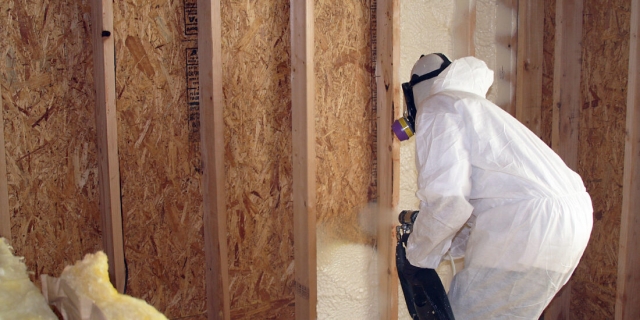Choosing the right spray foam insulation installer is critical for ensuring the energy efficiency, comfort, and structural integrity of a property. Homeowners should ask six essential questions before hiring a contractor: Are they licensed and insured? What type of spray foam do they use? What training and certifications do their technicians have? How do they prepare the site and ensure safety? Can they provide a detailed, itemized quote? And what warranties do they offer on materials and workmanship?
Asking these questions helps property owners vet potential installers thoroughly, moving beyond price to focus on quality, safety, and long-term value. This article breaks down each question, explaining why it matters and what to look for in a contractor's response. The guidance provided is based on insights from experienced industry professionals who understand the difference between a standard job and a professional spray foam installer.
Verify Licensing and Insurance
A professional spray foam installer must carry adequate licensing and insurance. This is non-negotiable, as it protects the property owner from liability in case of accidents or property damage during the project. The first step is to confirm the company holds a valid business license to operate in the specific city or state.
Next, inquire about their insurance coverage. An installer should have two primary types of insurance:
- General Liability Insurance: This covers accidental damage to the property. For example, if equipment damages a wall or overspray gets on finished surfaces, this policy handles the repair costs.
- Workers' Compensation: This protects the homeowner if an installer's employee is injured on the job. Without it, the property owner could be held financially responsible for medical bills and lost wages.
Bonus Tip: Do not just take a contractor's word for it. Request that a certificate of insurance (COI) be sent directly from their insurance provider. This document verifies that the policies are active and meet the required coverage limits.
Understand the Materials and Equipment Used

Not all spray foam is the same. Installers use two main types: open-cell and closed-cell. A knowledgeable contractor will recommend the right product based on the application, climate, and project goals. Open-cell foam is lighter, less dense, and offers excellent sound-dampening qualities. Closed-cell foam is rigid, dense, and acts as a vapor barrier, making it ideal for areas prone to moisture. The U.S. residential insulation market is seeing increased demand for closed-cell foam, which offers superior R-value per inch and adds structural strength to walls.
Asking what specific brand of foam they use and why can also reveal a contractor's expertise. Reputable installers partner with established manufacturers and can explain their choice based on chemical consistency, performance data, and environmental certifications.
Comparing Open-Cell and Closed-Cell Foam
|
Feature |
Open-Cell Spray Foam |
Closed-Cell Spray Foam |
|---|---|---|
|
R-Value (per inch) |
R-3.5 to R-3.8 |
R-6.0 to R-7.0 |
|
Vapor Permeability |
Permeable (Allows vapor to pass) |
Impermeable (Blocks vapor) |
|
Density |
Low (0.5 lbs/cubic foot) |
High (2.0 lbs/cubic foot) |
|
Structural Strength |
Adds no structural rigidity |
Adds significant structural rigidity |
|
Common Application |
Interior walls, attics (for sound) |
Basements, crawl spaces, roofs |
|
Cost |
Lower |
Higher |
Inquire About Technician Training and Certification
Spray foam insulation is a chemical product created on-site by combining two components under specific temperature and pressure conditions. The quality of the final product depends entirely on the skill of the technician operating the equipment. Improper application can lead to poor adhesion, off-ratio mixing, or reduced R-value.
Ask prospective installers about their team's training. Leading contractors invest in formal certification programs, such as those offered by the Spray Polyurethane Foam Alliance (SPFA). An SPFA-certified installer has demonstrated knowledge of material science, application techniques, and building codes. Experience is equally important. Find out how many years the lead technician assigned to the project has been installing spray foam. A professional spray foam contractor can adapt to unexpected site conditions and ensure a flawless application.
Review Site Preparation and Safety Protocols
A professional installation process prioritizes safety and cleanliness. A contractor should provide a clear plan for preparing the work area before spraying begins. This includes:
- Covering floors, windows, and any belongings in the vicinity with plastic sheeting.
- Sealing off the work area from the rest of the building to contain fumes and overspray.
- Ensuring the HVAC system is turned off and covered to prevent chemical vapors from circulating.
Safety is paramount. The installation team must wear appropriate Personal Protective Equipment (PPE), including full-body suits, gloves, and fresh-air respirators. The installer should also provide clear instructions on re-entry times for homeowners. Typically, residents and pets must vacate the premises for 24 hours to allow the foam to cure fully and any airborne vapors to dissipate.
Request a Detailed and Itemized Quote
A vague or lump-sum quote is a red flag. A transparent and professional installer will provide a detailed proposal that breaks down all costs. The industry has seen a wide variance in project costs, often falling between $1.50 and $4.50 per board foot, making detailed quotes essential for comparing offers.
The quote should clearly state:
- The total square footage of the area to be insulated.
- The specified thickness (in inches) of the applied foam.
- The type of foam to be used (open-cell or closed-cell).
- The total cost, separated into materials and labor.
- Any additional fees for site preparation or cleanup.
This level of detail allows property owners to compare apples to apples and ensures there are no hidden charges later. It also serves as a written record of the agreed-upon scope of work.
Clarify Warranty and Post-Installation Support
Finally, a reputable installer will stand behind their work. There are typically two types of warranties involved in a spray foam project. The first is a manufacturer's warranty on the foam product itself, which often covers issues like shrinkage or chemical breakdown for the life of the building.
The second, and equally important, warranty covers the installer's workmanship. This warranty covers any defects related to the application process, such as the foam pulling away from studs (delamination) or not being applied to the agreed-upon thickness. Ask for a copy of both warranties and ensure they are in writing. A strong workmanship warranty indicates the company is confident in its team's skills and is committed to customer satisfaction.
Bonus Tip: Inquire about their process for handling service calls. If an issue arises after the job is complete, how quickly do they respond? A contractor's commitment to post-installation support is a strong indicator of their professionalism.
Frequently Asked Questions About Spray Foam Installers
How long does a spray foam installation take?
Most residential projects, such as an attic or a full home, can be completed in one to three days, depending on the size and complexity of the job.
Is spray foam a fire hazard?
Modern spray foam insulation contains fire-retardant chemicals and must meet stringent building code requirements for fire safety. When properly installed and covered by a thermal barrier like drywall, it does not pose an undue fire risk.
Can spray foam be installed in an existing home?
Yes, spray foam is commonly used in retrofitting existing homes. It can be injected into wall cavities ("pour-in-place" foam) or sprayed onto open surfaces like attic floors, roof decks, and crawl space walls.
How much does spray foam insulation cost compared to other types?
Spray foam insulation generally has a higher initial cost than traditional options like fiberglass or cellulose. However, its air-sealing capabilities can reduce energy bills by up to 40%, offering a faster return on investment through lower utility costs.
What is the R-value of spray foam?
Closed-cell spray foam has one of the highest R-values on the market, ranging from R-6 to R-7 per inch. Open-cell foam offers an R-value of around R-3.7 per inch. A professional installer will apply the foam to the thickness required to meet or exceed local building codes.
Will spray foam damage my roof or walls?
When installed correctly by a trained professional, spray foam will not damage a property. In fact, closed-cell foam can add structural strength to wall assemblies and roof decks. Problems typically arise from improper application by unqualified installers.
Does spray foam insulation need to be vented in an attic?
When spray foam is applied directly to the underside of the roof deck, it creates an unvented or "conditioned" attic. This method brings the attic into the home's thermal envelope, eliminating the need for traditional vents and resulting in a more energy-efficient space.
How do I know if the foam was installed correctly?
A proper installation results in a uniform, consistent appearance. The foam should be applied to the specified depth, adhere fully to the substrate without gaps, and have a consistent color and texture. An experienced installer will perform quality checks throughout the process.
Making an Informed Choice for Your Property
Choosing a spray foam installer is a decision that impacts a home's performance for decades. By asking about licensing, materials, training, safety, quotes, and warranties—and by checking online reviews and local references—property owners can confidently select a qualified professional. A knowledgeable installer can also provide climate-specific recommendations, such as advising on whether the added vapor barrier of closed-cell foam is necessary in humid areas. A reputable contractor will welcome these questions and demonstrate a commitment to quality, ensuring the job is done correctly to deliver lasting comfort and energy savings.
Connect with an Experienced Insulation Team
For property owners seeking a professional assessment and clear answers to their questions, consulting with an established company is a recommended next step. Experienced teams can evaluate a building's specific needs and provide a comprehensive plan for improving its thermal performance. Companies like Spray Foam Tech specialize in providing detailed consultations for residential and commercial projects. Homeowners can reach out for project-specific advice by calling (737) 777-9590 or sending an email to oldworldtx@hotmail.com to schedule a consultation.
Reviewer: Maria Lopez reviewed the article and brought 12 years of insulation industry experience to improve the guidance. Practical tips were added, and the content was made clearer and more useful for contractors working in the field every day.







